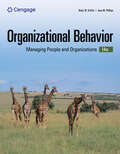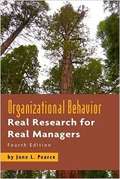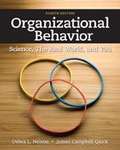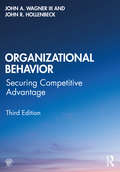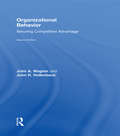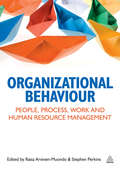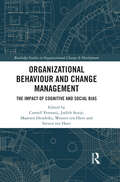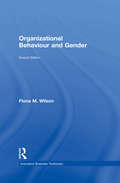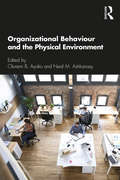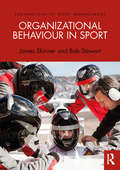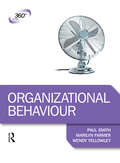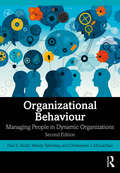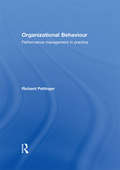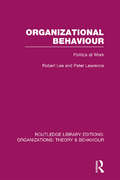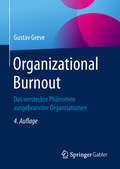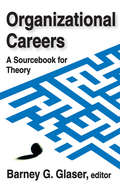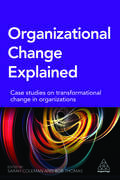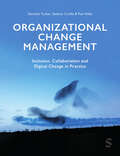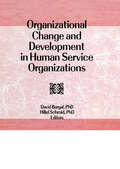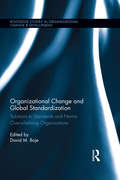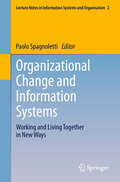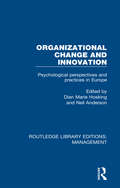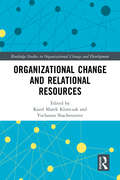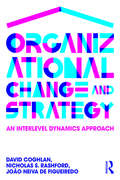- Table View
- List View
Organizational Behavior: Managing People and Organizations
by Ricky W. Griffin Jean M. PhillipsBalance today's most recent organizational behavior developments and trends with proven classic management ideas when you use Griffin/Phillips' ORGANIZATIONAL BEHAVIOR: MANAGING PEOPLE AND ORGANIZATIONS,14E. This applied, student-oriented approach emphasizes how to think and act like a successful manager as students examine the fundamentals of employee behavior. Updated learning features and chapter-opening "Real-World Challenges," the latest research findings and revised content all reflect today's most recent changes in organizational behavior (OB). Current, applied examples from well-known organizations work with in-chapter cases, self-assessments, video cases and exercises to create a reader-friendly focus. Students examine OB's most pressing issues as they develop the skills, tools and resources to personally succeed and effectively lead others in the modern workplace. MindTap digital resources further reinforce critical OB concepts.
Organizational Behavior: Real Research for Real Managers
by Jone L. PearceThis is a book for people who want to understand organizations so they can take charge of the organizations in their lives. Organizational Behavior Real Research for Real Managers addresses those practical problems managers face in doing their organizational work. It looks to systematic organizational behavior research seeking to discover which organizational actions and practices actually do and do not work. The text actually translates the scholarly research for real managers seeking to understand and control organizations.
Organizational Behavior: Science, The Real World, And You
by James Campbell Quick Debra L. NelsonGuide today's students as they learn not only the concepts and theories that enhance the management of human behavior at work but also how to practice these skills with Nelson/Quick's ORGANIZATIONAL BEHAVIOR. The latest edition of this leading text clearly demonstrates how organizational behavior theories and research apply to companies today with engaging cases, meaningful exercises, and examples that include six new focus companies students will instantly recognize. The authors present foundational organizational behavior topics, such as motivation, leadership, teamwork, and communication. Readers also examine emerging issues, such as the theme of change as well as globalization, diversity, and ethics. The authors anchor the book's multifaceted approach in both classic research and leading-edge scholarship. Timely examples from all types of organizations reflect today's most current trends. Self-assessments and other interactive learning opportunities encourage each reader to grow and develop--both as an individual and as an important contributor to an organization.
Organizational Behavior: Securing Competitive Advantage
by John A. Wagner III John R HollenbeckThe management of organizational behavior is a critically important source of competitive advantage in today’s organizations. Managers must be able to capitalize on employees’ individual differences as jobs are designed, teams are formed, work is structured, and change is facilitated. This textbook, now in its third edition, provides its readers with the knowledge required to succeed as managers under these circumstances. In this book, John Wagner and John Hollenbeck make the key connection between theory and practice to help students excel as managers charged with the task of securing competitive advantage. They present students with a variety of helpful learning tools, including: • Coverage of the full spectrum of organizational behavior topics • Managerial models that are based in many instances on hundreds of research studies and decades of management practice – not the latest fad • Completely new introductory mini-cases and updated examples throughout the text to help students contextualize organizational behavior theory and understand its application in today’s business world This ideal book for upper-level undergraduate and postgraduate students of organizational behavior is written to motivate exceptional student performance and contribute to their lasting managerial success. Online resources, including PowerPoint slides and test banks, round out this essential resource for instructors and students of organizational behavior.
Organizational Behavior: Securing Competitive Advantage (Management Ser.)
by John A. Wagner III John R. HollenbeckThe management of organizational behavior is a critically important source of competitive advantage in today's organizations. Every organization's members share a constellation of skills, abilities, and motivations that differentiates it from every other firm. To gain advantage, managers must be able to capitalize on these individual differences as jobs are designed, teams are formed, work is structured, and change is facilitated. This textbook, now in its second edition, provides its readers with the knowledge required to succeed as managers under these circumstances. In this book, John Wagner and John Hollenbeck make the key connection between theory and practice to help students excel as managers charged with the task of securing competitive advantage. They present students with a variety of helpful learning tools, including: Coverage of the full spectrum of organizational behavior topics Managerial models that are based in many instances on hundreds of research studies and decades of management practice Introductory mini-cases and current examples throughout the the text to help students contextualize organizational behavior theory and understand its application in today's business world The ideal book for undergraduate and graduate students of organizational behavior, Organizational Behavior: Securing Competitive Advantage is written to motivate exceptional student performance and contribute to their lasting managerial success.
Organizational Behaviour
by Raisa Arvinen-Muondo Stephen PerkinsOrganizational Behaviour bridges the gap between OB and HRM, and the interrelated nature of these fields of study that are more often than not treated separately. It helps the reader to relate the OB canon to their experiences in the world of work and organizations and prompts them to question the way relationships around employment are managed within these institutions.
Organizational Behaviour and Change Management: The Impact of Cognitive and Social Bias (Routledge Studies in Organizational Change & Development)
by Steven ten Have Wouter ten Have Cornell Vernooij Judith Stuijt Maarten HendriksPeople are social animals and change is a social process. To understand this social process and explain the thoughts, feelings and behaviours of individuals, knowledge of how people are influenced by the presence of others is crucial. In this regard, bias, is a concept with a lot of potential. Cognitive and social biases, by influencing human thinking, feelings, and behaviour, provide insights and knowledge that are helpful, if not essential for the field of organisational behaviour and change management. The statements stated above may seem obvious and self-evident, but practice as well as science, show that it is not. Organizational Behaviour and Change Management: The Impact of Cognitive and Social Bias aims at unleashing the potential of cognitive and social biases to develop a more effective change management theory and practice. To do so thousands of scientific articles were analysed and assessed. The most prominent biases are structured by using a practical and comprehensible framework based on five core social motives (belonging, understanding, controlling, trusting and self-enhancing). With its evidence-based, systematic and integrative approach, this book provides scientists and practitioners in the field of organisational behaviour and change management with the best available evidence, linking biases to organisational behaviour and change and thereby further enriching the field of change management.
Organizational Behaviour and Gender
by Fiona M. WilsonOrganizational Behaviour and Gender provides an alternative to the gender silence of the standard OB textbooks. This Second Edition updates and expands the text's coverage and employs the most recent research findings to portray the world of work in a realistic manner. Organizational Behaviour and Gender is a comprehensive text. The text examines some of the assumptions that have been made about women at work - for example that women's 'difference' is rooted in biology and that women and men have contrasting (and even polar opposite) skills and attitudes. The text considers the key topics in OB (such as selection, assessment,leadership and motivation) to test such assumptions. The book describes the reality of working life for women. It examines issues of low pay, part-time working, family responsibilities, home working and horizontal and vertical job segregation. It asks whether inequality of opportunity comes about because of actual gender differences or from prejudicial expectations and thinking. The last chapter is about sex and sexuality in organizations. Sexual behaviour in organizations is pervasive but is rarely discussed in OB textbooks. This chapter describes the masculine and heterosexual business environment and examines the issues of work romances and sexual harassment. The text provides numerous learning aids (including discussion topics and chapter questions) to assist both the lecturer and the student.
Organizational Behaviour and the Physical Environment
by Neal M. Ashkanasy Oluremi B. AyokoThis book looks at how the physical environment of work shapes organizational behaviour, demonstrating that our physical surroundings at work can have a big influence on employee productivity, performance and wellbeing. Drawing upon the latest research, Organizational Behaviour and the Physical Environment provides comprehensive coverage of the different aspects of the physical environment at work – the buildings, furnishings, equipment, lighting, air quality and their configurations. From theories of psychological ownership and work design, to cultural issues and technology in the workplace, its international range of contributors provide voices from Australasia, North America, Europe and the Middle East. This book will be invaluable supplementary reading for advanced students, researchers and practitioners across the fields of organizational behaviour, HRM, organizational and environmental psychology, and workspace design.
Organizational Behaviour in Sport (Foundations of Sport Management)
by Bob Stewart James SkinnerWhat makes a sport enterprise successful? How can managers working in sport improve organizational effectiveness through strategic behaviour management? This comprehensive and accessible textbook addresses these important questions and examines the theories that underpin organizational analysis in sport. Helping both students and practitioners to understand the different types of behaviour that occur within a sports enterprise, it also demonstrates how to develop ways of managing behaviour more effectively for the benefit of all stakeholders. The book explores behaviour on individual, interpersonal, group and whole-organization levels, and presents an evidence-based framework for analysis built around key concepts such as: Change and culture Leadership Motivation, rewards and incentives Power and influence Conflict, disputes and grievances Equity, diversity and inclusion. With international case studies, learning objectives, review questions and guides to further reading included in every chapter, no other textbook develops critical skills or an awareness of ethical issues in such detail and depth. Organizational Behaviour in Sport is essential reading for all students and practitioners working in sport, leisure or recreation management.
Organizational Behaviour: Managing People In Dynamic Organizations (360 Degree Business)
by Paul Smith Marilyn Farmer Wendy YellowleyClear, concise, and written by experts currently lecturing in the field, Organizational Behaviour focuses exclusively on what you need to know for success in your business course and today's global economy. For a focused view of organizational behaviour, this is the book for you. The concise, accessible style makes this the perfect text for introductory courses covering organizations and is well suited to international students. This innovative textbook features: a clear and thought-provoking introduction to organizational behaviourrelevant, cutting-edge case studies with global focus hot topics such as emotional intelligence, corporate responsibility, Generation Y and ethics keep you up-to-date with current business thinking summaries, activities, key theme boxes and review questions to help reinforce your understanding Part of the 360 Degree Business series, which provides accessible yet stimulating introductions to core business studies modules, this textbook comes with additional support materials including further case studies, revision summaries and interactive multiple choice questions available online at www.routledge.com/cw/farmer.
Organizational Behaviour: Managing People in Dynamic Organizations
by Wendy Yellowley Paul E. Smith Christopher J. McLachlanClear, concise, and written by experts currently lecturing in the field, Organizational Behaviour focuses exclusively on what you need to know for success in your business course and today’s global economy. The text brings together a vast range of ideas, models, and concepts on organizational behaviour from an array of fields, such as psychology, sociology, history, economics, and politics. This information is presented in bite-sized, digestible pieces to create an accessible and engaging style that makes it the perfect text for introductory courses covering organizations. Key features include: a clear and thought-provoking introduction to organizational behaviour relevant, cutting-edge case studies with global focus hot topics such as eOrganizations, ethics, and diversity, keeping you up-to-date with current business thinking further reading, summaries, activities, key theme boxes, and review questions to help reinforce your understanding This textbook will be a valuable resource for students of business and management studies, organization studies, psychology, and sociology.
Organizational Behaviour: Performance Management in Practice (Master Series (business) Ser.)
by Richard PettingerThis book offers a fresh and comprehensive approach to the essentials that constitute the discipline of organizational behaviour with a strong emphasis on the application of organizational behaviour and performance management in practice. It concentrates on the development of effective patterns of behaviour, values and attitudes, and relates these issues to effective organization performance in times of organizational and environmental change and turbulence. The book is divided into four parts, providing a clear structure for the study of the subject: Part One: The context of organizational behaviour Part Two: The disciplines of organizational behaviour Part Three: Organizational behaviour in practice Part Four: Organizational behaviour – expertise and application Organizational Behaviour is packed with references to current topics, practical examples and case studies from large corporations from around the world, including Ryanair, The Body Shop and RBS. This book covers examples of both good and bad practice, making it an interesting and unique introduction to the study of organizational behaviour.
Organizational Behaviour: Politics at Work (Routledge Library Editions: Organizations)
by Robert Lee Peter LawrenceOrganizations do not have goals – only people do. Furthermore, people within the same organizations have different goals. This book takes this as its starting point, recognizing that organizations are a dynamic coalition of individuals and groups competing and co-operating as they each pursue their various objectives. Power is a fundamental part of organizational behaviour but many previous studies failed to recognize its centrality. This book remedies this.
Organizational Burnout: Das versteckte Phänomen ausgebrannter Organisationen
by Gustav GreveErfahren Sie in diesem Buch alles rund um das Thema Managementfehler und Organizational BurnoutBleiben bei einer gut aufgestellten Unternehmensorganisation die bisherigen Erfolge aus, dann ist oft ein sogenannter Organizational Burnout (OBO) die Ursache dafür. Gustav Greve beschreibt das weit verbreitete Phänomen in diesem Buch eindrücklich und anschaulich. Seit 2010 sind 143.4751 Unternehmen in die Insolvenz gegangen - davon mindestens die Hälfte wegen Managementfehlern. Viele ausgebrannte Organisationen könnten heute noch dabei sein, wenn sie sich diesem aktuellen Phänomen souverän gestellt hätten. Aus diesem Grund schildert der Autor in seinem Buch die typischen Gründe, Symptome und Folgen des Organizational Burnout sowie eine wirksame Therapie. Er erklärt die Erfolgsdefizite der betroffenen Unternehmen und zeigt damit einen Weg aus der Krise auf. Ein sehr praxisorientiertes Fachbuch für Unternehmer, Führungskräfte und BeraterGreves Werk „Organizational Burnout“ ist ein Buch aus der Praxis für die Praxis. Es richtet sich an:EigentümerUnternehmerFührungskräfteMitarbeiter BeraterDas Werk basiert in erster Linie auf Greves Erfahrungen als Unternehmer, CEO und Unternehmensberater. Dem Autor ist es damit gelungen, ein leicht lesbares Buch über Organizational Burnout mit Tiefgang und umfassenden Begründungen zu schreiben, das nie belehrend, aber zugleich doch lehrreich ist. Greve möchte damit zeigen, wie Unternehmen den Paradigmenwechsel schaffen und neue Energie für einen organisationsmentalen Turnaround finden. Für die 4. Auflage wurde das Buch vollständig durchgesehen und aktualisiert.
Organizational Careers: A Sourcebook for Theory
by Barney GlaserAlthough sociologists have written extensively on the broad subject of occupational careers, generally they have referred only incidentally to organizational careers within work organizations. In this pioneering sourcebook, now considered a classic, Glaser gathered from the literature of occupational sociology those studies that bear most directly on organizational careers. His objective was to provide the first survey of the substantial body of data on the subject and to place this data in a framework that illustrates its significance for the development of theory. In an extensive introduction, the editor explains the several purposes of the book and describes in detail the process of comparative analysis through which sociological theory on organizational careers can be generated. Organized around general themes such as recruitment, motivation, commitment, mobility, and succession, the writings of prominent sociologists--including Riesman, Caplow, Hughes, Becker, and Wilensky--form the content of the book and systematically cover every important facet of organizational careers. The editor's introductions to each section of the book alert the reader to the general phenomena--such as processes, conditions, categories, hypotheses, and properties--that crosscut and are generally relevant to all organizational careers and are, therefore, the raw material of theory. These introductions also suggest questions and problems for further analysis and research. This book as a whole stands as a demonstration of the contributors' method of how the sociologist, working from the data of research, can generate grounded, formal theory on this or any social phenomenon. This book also presents a vital body of data on organizational careers and a guide to further research that will be of great use both to occupational sociologists and to all those involved in the study of organizations.
Organizational Change Explained: Case Studies on Transformational Change in Organizations
by Sarah Coleman Bob ThomasThe best way to learn how to navigate change successfully is to look at practical examples of change management programmes. Organizational Change Explained shares stories and insights from experienced change practitioners so professionals can reflect on their own work, respond critically to what others have done, and take away new tools and techniques to apply to their own change management practice. The book includes a range of cases from different sectors and countries including GlaxoSmithKline and the NHS to offer insights no matter the scale of the change management programme. Organized around central themes such as shaping and design, change leadership, and communication and engagement, Organizational Change Explained presents each case alongside an introduction, conclusion, list of key learning points, questions for reflection and sources of further reading. The book is invaluable to anyone tasked with leading or managing change within their teams, projects, departments or divisions, whether at local level or across geographic locations, countries and cultures.
Organizational Change Management: Inclusion, Collaboration and Digital Change in Practice
by Danielle A Tucker Stefano Cirella Paul R KellyThis book offers a holistic introduction to Organizational Change Management through a distinct and timely perspective of organizational change agency. It takes a highly practical and unique approach, with cutting-edge chapters on digital transformation, creativity, power and inclusivity and diversity. Key features include: Case Studies based on real companies, which can be used to study chapter topics across a variety of international contexts, industries, and organizational forms. Experiential and Discussion Activities which provide an opportunity to gain invaluable insight needed in the workplace.
Organizational Change Management: Inclusion, Collaboration and Digital Change in Practice
by Danielle A Tucker Stefano Cirella Paul R KellyThis book offers a holistic introduction to Organizational Change Management through a distinct and timely perspective of organizational change agency. It takes a highly practical and unique approach, with cutting-edge chapters on digital transformation, creativity, power and inclusivity and diversity. Key features include: Case Studies based on real companies, which can be used to study chapter topics across a variety of international contexts, industries, and organizational forms. Experiential and Discussion Activities which provide an opportunity to gain invaluable insight needed in the workplace.
Organizational Change and Development in Human Service Organizations
by Hillel Schmid David BargalThrough change and development, human service organizations can promote the well-being of their clients more effectively. This important book describes and analyzes recent research on organizational change and development in the social and human services. It is particularly relevant in light of the significant changes in these organizations during the last decade and the lack of literature in the area. Organizational Change and Development in Human Service Organizations brings together the work of scholars who deal with social welfare administration and change in human services, combining research studies with theoretical approaches to change and development. It helps readers better understand the process of change and the role of the environment in creating change. Insightful chapters encourage practitioners, scholars, and students to plan change in organizations, utilize models of change and organizational development in real life, and evaluate change and its results and impacts. This much-needed book addresses a variety of topics, including: the uses of force field analysis in assessing prospects for organizational change planned change in voluntary and government social service agencies interorganizational coordination of services to children in state custody early stages in the creation of self-help organizations organization and community transformation organizational development in public social services strategic and structural change in human service organizations a developmental approach to program evaluationMany readers will find the information in Organizational Change and Development in Human Service Organizations to be extremely beneficial in their daily work. Covering the important issues, it gives readers a deeper insight into the processes of change and development so they can provide better services to their clients. This book is a vital resource for social workers, professionals in public administration, individuals involved in MSW programs, and students in the social sciences, including sociology and political science.
Organizational Change and Global Standardization: Solutions to Standards and Norms Overwhelming Organizations (Routledge Studies in Organizational Change & Development)
by David M. BojeOrganizational Change and Global Standardization: Solutions to Standards and Norms Overwhelming Organizations takes an organizational change approach to the overflow of standards and norms, looking at how to deal effectively and ethically with four kinds of standards and norms businesses face when they go global: (1) accounting & finance (2) international & world trade,(3) social and (4) safety & quality & environment. It is part of a larger problem faced by not only business, but every sort of organization - how to live with the epidemic of standards and norms, often in conflict, many just unnecessary, and a few that are quite helpful and important. There are good reasons to have International Standards Organization (ISO), International Labor Organization (ILO), World Trade Organization (WTO), North Atlantic Treaty Association (NAFTA), International accounting Standards Boards (IASB), International Financial Reporting Standards (IFRS)), and many more standard-setting organizations issuing, auditing, proposing codes of ethics, and certifying standards and norms. However, there are important, poorly understood organizational change consequences to the contagion of standards and norms. This volume brings together a unique group of authors who are working on a pragmatic way for organizations to deal with an overflow of standards and norms that are often at heads, ambiguous, or simply created to produce more work for a burgeoning standards setting industry. The aim of Organizational Change and Global Standardization is to stimulate a critical analysis within the framework of analytical and pragmatic approach to an overwhelming bureaucratization of the managed and organized global activities.
Organizational Change and Information Systems: Working and Living Together in New Ways
by Paolo SpagnolettiThis book examines a range of issues emerging from the interaction of Information Technologies and organizational systems. It contains a collection of research papers focusing on themes of growing interest in the field of Information Systems, Organization Studies, and Management. The book offers a multidisciplinary view on Information Systems aiming to disseminate academic knowledge. It might be particularly relevant to IT practitioners such as information systems managers, business managers and IT consultants. The volume is divided into six sections, each one focusing on a specific theme. The content of each section is based on a selection of the best papers (original double blind peer reviewed contributions) presented at the annual conference of the Italian chapter of AIS, which has been held in Rome, Italy in September 2012.
Organizational Change and Innovation: Psychological Perspectives and Practices in Europe (Routledge Library Editions: Management)
by Neil Anderson Dian Marie HoskingFirst published in 1992. Organisational change and innovation has been at the centre of much management literature, which has been informed by debates in organizational behaviour and strategic management. The psychology of how people in organizations adapt to and manage change is key to our understanding of the processes by which such changes can occur successfully. Organizational Change and Innovation brings together the recent research findings of leading European work and organization psychologists, who take stock of existing theories about organizational change in the light of new case material. Their findings, from a range of cultural and national contexts, challenge some previously accepted models and set a new agenda for future research. In particular, the volume provides new perspectives on the person organization relationship; the political qualities of organizational change; the input-output model of organizations as entities; and finally on research methodology.
Organizational Change and Relational Resources (Routledge Studies in Organizational Change & Development)
by Karol Marek KlimczakTransitioning organizations to the new normal following environmental shocks, economic upheavals and technological innovations is a challenge to classic organizational management, because no single organization knows with precision what the target of change is. Resources created and operated in relationships can support the organization in overcoming its constraints, changing faster, and adapting better. This book takes a relational perspective on how organizations adjust and adapt to their turbulent environment. Drawing from a broad literature and empirical studies, this book offers novel insights into how businesses create, grow, and manage relationships with partners to support strategic change. It discusses the benefits of cooperating with partners and relying on shared resources, while controlling relational risks. It presents key relational processes including organizational intelligence, open culture, knowledge sharing routines, motivation, co-creation, and communication. It discusses focus areas: longevity of family firms, improving health and safety in medical services, crisis management, public administration reforms, and relational risk management. This book is a valuable resource for researchers and students in the fields of organizational studies, organizational change, technology, and innovation management. Managers and entrepreneurs can find inspiration, motivation, and strategies for implementing and managing relationships along the value chain.
Organizational Change and Strategy: An Interlevel Dynamics Approach
by David Coghlan Nicholas S. Rashford João Neiva de FigueiredoOrganizations change, usually driven by strategies, yet strategic management and organizational change are generally understood as separate domains in the business world. This book integrates the behavioural dynamics of learning, change and strategy at and across individual, team, interdepartmental, group and organizational levels. This new edition emphasizes what can be done in organizations to enable strategy to be effective and to help organizations to change and learn. Central to the book is a reflexive engagement approach through inviting the readers to apply concepts to their own organizational situations and via reflective exercises. The authors also offer cases from a wide range of organizations, from universities to steel and digital businesses. This practical book addresses managers, consultants, students and researchers and provides specific orientation to assist each readership group to learn from its own perspective.
